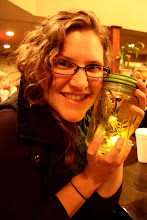here's a little something I've been working on this morning (after getting up to go to church by myself and then being DUPED by stupid google maps' WRONG DIRECTIONS and getting lost, missing church and coming home):
maybe i feel natural doing "church" with a small fellowship of people in my home because it is a faded photograph of how my faith began.
let me explain.
in Tim Keller's book The Prodigal God, he says this regarding the early church:
"when Christianity first arose in the world it was not called a religion. it was the non-religion. imagine the neighbors of early Christians asking them about their faith. 'Where's your temple?' they'd ask. The Christians would reply that they didn't have a temple. 'But how could that be? where do your priests labor?' The Christians would have replied that they didn't have priests. 'but...but," the neighbors would have sputtered, 'where are the sacrifices made to please your gods?' the Christians would have responded that they did not make sacrifices anymore. Jesus himself was the temple to end all temples, the priest to end all priests, the sacrifice to end all sacrifices."
let me also paraphrase some of the other things Keller says. He tells us that these new ideas represented in the Christian faith were unlike anything of the day...and that's why the Romans dubbed them "atheists"--it was unclassifiable. They didn't have a category or name for it.
He also says "if the preaching of our ministers and the practice of our parishioners do not have the same effect on people that Jesus had, then we must not be declaring the same message that Jesus did." but that is actually a whole other topic for a whole other day.
Back to point 1. perhaps the traditional idea of Christian church today has become, in some ways, the Jewish temples of Christ's day. perhaps we are so caught up in the "temple, priest, sacrifice" rhythm of religion that it feels blasphemous for us to say that Christ is just as much in a home gathering of four people as He is in a stained-glass-window-church building filled with 200. to think of it practically, the early Christians began "church" this way. "Church" was really a word that described the entirety of the family of God--the larger picture of the family of Christ-followers scattered across the globe, across gender, age and ethnicity. now suddenly it seems to denote individual bodies of believers who often function as distanced islands on a secular sea, and voila! we find ourselves unable to place the lone Christian floating on a raft in the water who does not "belong" (and I use this satirically) to any one piece of land.
oh, please understand that I am not condemning the organized church. in fact, i feel the same misgivings, the same puzzlement, the same gravitational pull to belong to a building and a worship leader, a pastor and a bulletin and a system of doing things.
it's been harder of late to think that way, though. simply because of doubt and frustration and a heap of anger. because it's hard to sit down and want to read the Bible, or engage in prayer when you aren't so sure what it is or what it looks like, or to have a real, vibrant relationship with Christ when you keep coming back to all those ritual MUSTS and DO NOTS and can't seem to break away from them. golly, it's like these rituals are an atrophied limb that should just be lopped off, but you can't seem to part with it. they had their place once, but now they are just hindering learning to function in a new way.
so this morning, when it felt like God was playing a cruel joke on me--i was, after all, trying to go worship HIM, trying to be a part of a body of believers for HIM--i am going to claim that today is a lesson in this: "Yeah, I'm in a church building. But I'm also at Home. Let's have a cup of coffee."
1 year ago

